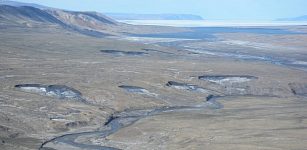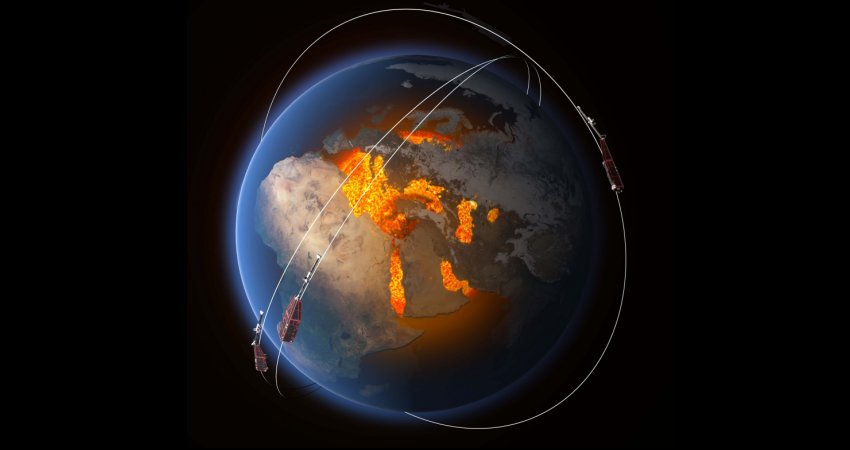Insects Could Be Wiped Out Within A Century – Alarming Report
Don Wood – MessageToEagle.com – Insects may be small and annoying at times, but they are a crucial component of our ecosystem. To put in simple terms – without insects, our animals, civilization, and ecosystems would be in serious trouble.
Extinction of insects is catastrophic for life on Earth. Humans need insects in order to live, and so do plants and animals.

Researchers studied a million insects. Credit Public Domain
Researchers are now sending us all a serious wakeup call. Studies show that the total mass of insects on our planet is dropping by 2.5% a year. This means all insects could be wiped out within a century.
Between 2008 and 2017, researchers from the Technical University of Munich (TUM) collected one million insects at 300 sites in Germany and the results of their study are not optimistic.
Scientists discovered that there were a third fewer species than 10 years ago, both in forested areas and grassland.
“Before our survey, it was unclear whether and to what extent forests were affected by the insect decline as well.
The fact that a large part of all insect groups is actually affected has not been clear so far,” Dr. Sebastian Seibold of TUM said.
Scientists report the insect biomass (the total weight of insects) has a decline of 40% since 2008.
In grasslands, insect numbers dropped to one-third of their previous level.
“A decline on that scale over a period of just 10 years came as a complete surprise to us—it is frightening, but fits the picture presented in a growing number of studies,” Professor Wolfgang Weisser of TUM added.
See also:
Spider With A Tail Found Preserved In Amber After 100 Million Years
Acacia Tree Uses Ants As Body Guards And Rewards Them With Shelter And Food
Only Female Mosquitoes Bite Humans And Animals
It is not the first time in Earth’s history a vast number of insects have vanished. Earth has suffered five mass extinction events in the past 550 million years.
The worst one took place about 250 million years ago, During the Permian Extinction, or “The Great Dying,” something killed about 90 percent of the planet’s species. Almost all life ended on Earth and the impacts of “The Great Dying” are still noticeable today.
Our planet is at the start of a sixth mass extinction in its history, with huge losses already reported in larger animals. The loss of insects has catastrophic consequences as these little creatures are are essential for the proper functioning of all ecosystems.
The decline in insects’ population is not limited to Germany. The crisis is global and something must be done now before it’s too late.
“If insect species losses cannot be halted, this will have catastrophic consequences for both the planet’s ecosystems and for the survival of mankind,” Francisco Sánchez-Bayo, at the University of Sydney, Australia said.
Written by Don Wood – MessageToEagle.com Staff
Related Posts
-
 Incredible Giant String-Like Sea Creature Spotted In Australia Stuns Scientists
No Comments | Apr 8, 2020
Incredible Giant String-Like Sea Creature Spotted In Australia Stuns Scientists
No Comments | Apr 8, 2020 -
 Kofun: Megalithic Keyhole-Shaped Tombs That Belonged To High Status People In Japan
No Comments | Sep 18, 2016
Kofun: Megalithic Keyhole-Shaped Tombs That Belonged To High Status People In Japan
No Comments | Sep 18, 2016 -
 Giant Hole Suddenly Re-Opens In Antarctica And Scientists Don’t Know Why
No Comments | Oct 15, 2017
Giant Hole Suddenly Re-Opens In Antarctica And Scientists Don’t Know Why
No Comments | Oct 15, 2017 -
 Antarctic Ice Shelf Twice The Size Of New York City Is Breaking Up
No Comments | Apr 8, 2019
Antarctic Ice Shelf Twice The Size Of New York City Is Breaking Up
No Comments | Apr 8, 2019 -
 Ancient Ruins Of Hovenweep: Impressive Puebloan Masonry
No Comments | Mar 15, 2016
Ancient Ruins Of Hovenweep: Impressive Puebloan Masonry
No Comments | Mar 15, 2016 -
 Canada’s High Arctic Terrain Changes Due To Summer Temperatures
No Comments | May 27, 2019
Canada’s High Arctic Terrain Changes Due To Summer Temperatures
No Comments | May 27, 2019 -
 Life Likely Existed On Earth 300 Million Years Earlier Than Previously Thought, Researchers Say
No Comments | Oct 19, 2015
Life Likely Existed On Earth 300 Million Years Earlier Than Previously Thought, Researchers Say
No Comments | Oct 19, 2015 -
 Extreme Weather Is Not Enough To Convince Skeptics Humans Are Responsible For Climate Change
No Comments | Oct 4, 2018
Extreme Weather Is Not Enough To Convince Skeptics Humans Are Responsible For Climate Change
No Comments | Oct 4, 2018 -
 Mystery Of The South Atlantic Anomaly – Earth’s Magnetic Field Is Weakening Between Africa And South America
No Comments | May 22, 2020
Mystery Of The South Atlantic Anomaly – Earth’s Magnetic Field Is Weakening Between Africa And South America
No Comments | May 22, 2020 -
 Evidence Of 2.68 Billion-Year-Old Continental Collisions In Wyoming’s Teton Range Discovered
No Comments | Feb 4, 2016
Evidence Of 2.68 Billion-Year-Old Continental Collisions In Wyoming’s Teton Range Discovered
No Comments | Feb 4, 2016
